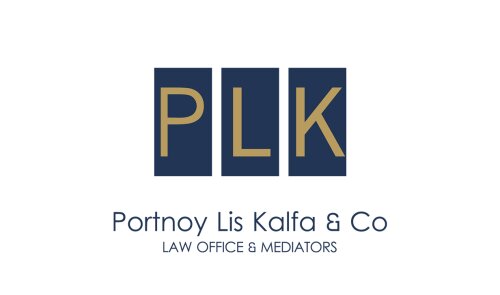Best Child Support Lawyers in Ashdod
Share your needs with us, get contacted by law firms.
Free. Takes 2 min.
Free Guide to Hiring a Family Lawyer
List of the best lawyers in Ashdod, Israel
About Child Support Law in Ashdod, Israel
Child support, known in Hebrew as "Mizonot," is a legal obligation for parents in Ashdod, as in all of Israel, to financially support their minor children. Israeli child support laws are rooted in both civil and religious legal systems, which influence how cases are handled. In Ashdod, child support matters may be adjudicated in either the Family Court or the Rabbinical Court, depending on the specifics of the case and the preference of the parties involved. The primary goal is always to ensure that children receive proper care and adequate financial support from both parents, irrespective of marital status.
Why You May Need a Lawyer
Navigating child support issues can be complex, emotional, and legally challenging. People in Ashdod might need legal help for reasons such as:
- Determining and calculating the correct amount of child support after separation or divorce.
- Ensuring proper enforcement of child support payments if a parent is not complying with a court order.
- Seeking changes in existing agreements due to changes in financial circumstances.
- Facing cross-border or international child support issues, especially if one parent lives abroad.
- Addressing questions of paternity when determining support obligations.
- Navigating disputes about the jurisdiction of the family or religious courts.
A qualified lawyer can provide guidance, represent your interests in court, negotiate agreements, and help protect your children's rights.
Local Laws Overview
In Ashdod, as part of Israel, child support laws are influenced by civil statutes and religious law, primarily Jewish law for Jewish citizens. Some key aspects include:
- Fathers are usually the primary obligated party for child support, especially for children under 15, even if the mother has a higher income.
- Child support is determined based on the needs of the child and the parents' financial capacities.
- For children aged 15 to 18, support is divided more proportionally based on both parents' incomes.
- Support generally continues until the child turns 18 and may be extended, in a reduced amount, during army service or post-secondary education until age 21.
- Courts have the discretion to determine the method of payment, frequency, and adjust the amount if circumstances change.
- Enforcement of child support orders is handled by the Enforcement and Collection Authority “Hotzaa LePoal.”
Understanding local nuances, especially decisions from local courts in Ashdod and the influence of both civil and religious law, is essential for anyone dealing with child support matters.
Frequently Asked Questions
What factors are used to determine child support in Ashdod?
Child support is calculated based on the child's needs, living arrangements, parents' incomes, and each parent's ability to pay. The court ensures the best interests of the child are prioritized.
Does the parent with custody always receive child support?
Usually, the parent with primary physical custody receives child support, but support arrangements vary case by case, especially in shared custody situations where both parents may contribute proportionally.
Can child support be changed if my financial situation changes?
Yes, either parent can request a change in child support if there is a significant change in income, employment status, or the needs of the child.
What age does child support end in Ashdod?
In general, child support is paid until the child turns 18. It may be extended in reduced form until age 21 if the child serves in the military or pursues full-time education right after high school.
What happens if a parent does not pay child support?
If a parent fails to pay, the Enforcement and Collection Authority can intervene to collect overdue payments, and serious legal consequences may follow for non-payment.
Is child support different if the parents were never married?
No, both parents have the same legal obligation to support their child, regardless of marital status. The process and calculation of support are the same for unmarried parents.
Can we agree on child support without going to court?
Yes, parents may reach an out-of-court agreement on child support, but for legal enforcement and protection, it is recommended to get such agreements approved by a court.
Can child support be paid directly to the child?
Typically, payments are made to the custodial parent or legal guardian to ensure funds are used for the child's needs. Exceptions may exist in specific cases, especially for adult children.
How is paternity established for child support purposes?
If there is a dispute, paternity may be determined by court-ordered DNA testing. Once established, the father is legally obligated to pay child support.
Who handles child support cases in Ashdod?
Child support cases can be addressed in the Family Court or, for Jewish citizens, the Rabbinical Court. The appropriate court depends on the family's religious affiliation and circumstances.
Additional Resources
- Enforcement and Collection Authority (“Hotzaa LePoal”) - Handles collection of unpaid child support and enforces court orders.
- Family Courts - Primary venue for civil child support disputes in Ashdod.
- Rabbinical Courts - For Jewish families, these courts may handle child support issues.
- Israeli Bar Association - Can help you locate qualified family law attorneys in Ashdod.
- Social Service Departments - Offer assistance and guidance for families in need.
- Legal Aid Bureau - For those who cannot afford a private attorney, legal aid is available through government services.
Next Steps
If you need legal advice about child support in Ashdod, consider the following steps:
- Gather all relevant documents, including income statements, existing agreements, court orders, and expenses related to your child's care.
- Consult with a qualified family law attorney who understands both civil and religious legal systems applicable in Ashdod.
- If financial support is urgent, contact the Family Court or Enforcement and Collection Authority to ensure immediate needs are addressed.
- Document all communications and agreements with the other parent.
- Consider seeking support from social services or legal aid if you face financial difficulties.
- Stay informed about your rights and obligations to protect your child's best interests throughout the process.
Taking these steps can help you navigate the complex landscape of child support law in Ashdod and ensure your children's well-being is safeguarded.
Lawzana helps you find the best lawyers and law firms in Ashdod through a curated and pre-screened list of qualified legal professionals. Our platform offers rankings and detailed profiles of attorneys and law firms, allowing you to compare based on practice areas, including Child Support, experience, and client feedback.
Each profile includes a description of the firm's areas of practice, client reviews, team members and partners, year of establishment, spoken languages, office locations, contact information, social media presence, and any published articles or resources. Most firms on our platform speak English and are experienced in both local and international legal matters.
Get a quote from top-rated law firms in Ashdod, Israel — quickly, securely, and without unnecessary hassle.
Disclaimer:
The information provided on this page is for general informational purposes only and does not constitute legal advice. While we strive to ensure the accuracy and relevance of the content, legal information may change over time, and interpretations of the law can vary. You should always consult with a qualified legal professional for advice specific to your situation.
We disclaim all liability for actions taken or not taken based on the content of this page. If you believe any information is incorrect or outdated, please contact us, and we will review and update it where appropriate.









